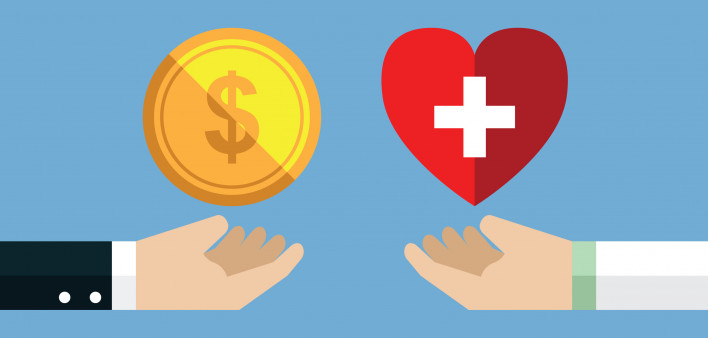HIV drugmakers Gilead Sciences and ViiV Healthcare and several LGBTQ groups and human rights organizations are offering a total of $5.5 million in grants to help community groups respond to the monkeypox health emergency. The funding arrives as the World Health Organization (WHO) and the U.S. Department of Health and Human Services have declared the growing monkeypox outbreaks a public health emergency.
Although anyone can get monkeypox, a majority of the cases so far have been among men who have sex with men, with a higher prevalence among people of color and those living with HIV (for specific breakdowns, see this recent federal health report). The organizations offering the emergency funding cater to these key population groups.
In one funding opportunity, Gilead Sciences, which makes several blockbuster HIV meds, will provide up to $5 million in a global grant organized by a team of organizations including GLAAD (an LGBTQ media advocacy group), the National Black Justice Coalition (NBJC), the National Center for Lesbian Rights (NCLR), the Human Rights Campaign (HRC, an LGBTQ advocacy group).
We’re collaborating with @GLAAD, @HRC, @NBJCOnTheMove, @NCLRights & @NMACCommunity to address #monkeypox, which disproportionately affects the LGBTQ+ community. We’re supporting education and a public policy response & creating an outbreak emergency fund: https://t.co/EbYQgLQ47f pic.twitter.com/HWl5wHUqTr
— Gilead Sciences (@GileadSciences) August 9, 2022
Grants of up to $50,000 will be available to existing grantees in regions with active monkeypox outbreaks, according to a Gilead press statement. In addition, the funding will support three key areas: a public education and vaccine hesitancy communications campaign, a public policy response and a global outbreak emergency fund.
NMAC (formerly the National Minority AIDS Council) will act as the policy response organizing center. “Through our extensive contacts at the federal level and with the support of our community partners, we will work with both the White House and Congress to provide the necessary resources to deal with this outbreak,” said NMAC executive direct Paul Kawata in the release. “Our top priorities will include making sure that vaccine access is equitable for all communities at risk and that any outreach plans will include ways to deal with vaccine hesitancy in a culturally competent way.”
“Throughout our history, Gilead has worked to address critical public health challenges and health care disparities, particularly those faced by the LGBTQ+ community or impacted by the HIV epidemic,” added Deborah Telman, executive vice president of corporate affairs and general counsel at Gilead Sciences. “Today, we are proud to work with our longtime collaborators around the world to help meet the immediate needs of impacted communities and to help identify longer-term solutions to this emerging crisis. At Gilead, we are also accelerating and expanding our early-stage antiviral drug screening program to identify new molecules for potential future treatment of [monkeypox] infection.”
In a separate funding announcement, ViiV Healthcare, an HIV-focused company owned by GlaxoSmithKline with Pfizer Inc. and Shionogi Limited, will make $500,000 in grants available through its ViiV Healthcare’s Positive Action Monkeypox Emergency Response Fund. The grants will focus on helping local HIV service providers respond to monkeypox.
Today, we announced an emergency response fund for community-based organizations that are responding to the monkeypox virus outbreak. We are committed to helping the LGBTQ, queer and HIV communities who are disproportionally affected by this public health crisis.
— ViiV Healthcare US (@ViiVUS) August 10, 2022
“We see again the critical role that community-based organizations play in responding to public health emergencies and pandemics, Lynn Baxter, head of ViiV Healthcare North America, said in the press statement. “Our Monkeypox Emergency Response Fund is designed to help frontline, grassroots organizations respond to the monkeypox emergency in the U.S. by providing much needed financial support to continue their work and meet the urgent need for monkeypox prevention, screening and education. For the past 30 years, we have worked alongside community-based organizations to address the evolving needs of the HIV community, and this fund is another example of our ongoing support.”
Applications for ViiV grants for up to $50,000 may be submitted until September 30. For more information, see ViiV’s request for proposals here.

Monkeypox soresUKHSA.
Monkeypox is not a new disease. It’s a virus similar to smallpox that is spread through skin-to-skin contact, notably during sex, as well as through contact with contaminated items, such as bed sheets. It can take up to three weeks for symptoms to appear. Monkeypox typically causes flu-like symptoms (fever, fatigue, etc.) as well as a rash, along with sores that can be itchy and very painful.
For more details, see the POZ Basics Monkeypox 101, and for a collection of related articles, click #Monkeypox and #Monkeypox Vaccine. You’ll find articles such as:







1 Comment
1 Comment